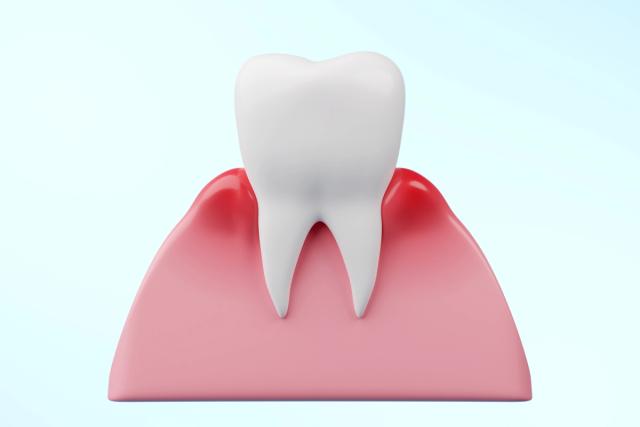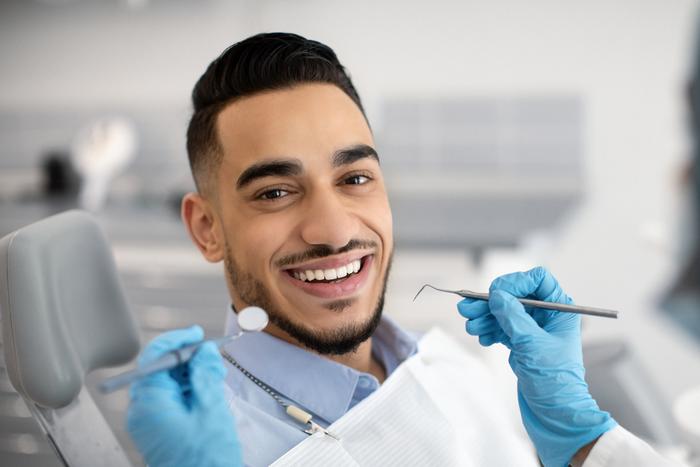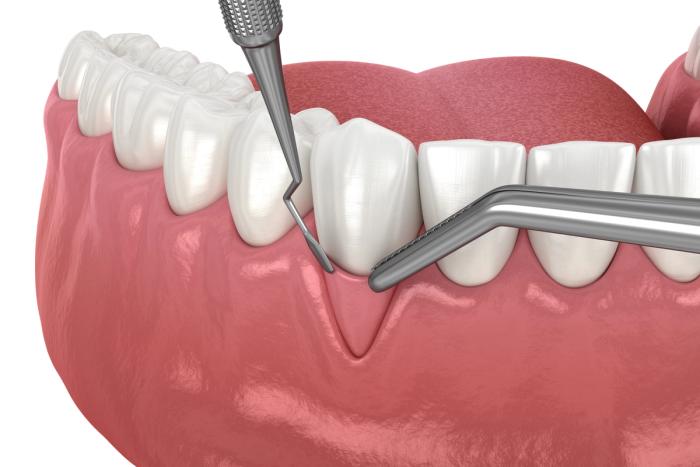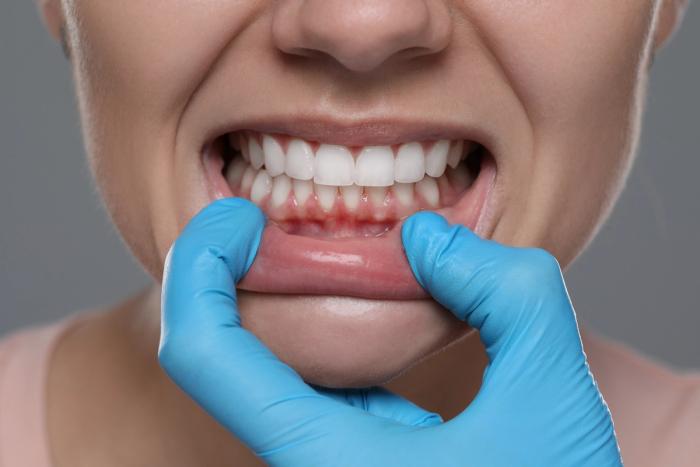Special: Get a FREE Whitening Pen for all new cleaning patients! Book your appointment today!
Gum disease, also known as periodontitis or periodontal disease, is a common infection of the bone and gums surrounding your teeth. If left untreated, it is also the leading cause of adult tooth loss.
Gingivitis is a milder infection that, untreated, will eventually evolve into periodontal disease. Thankfully with good home care and regular checkups, gingivitis can be reversed. Whereas periodontal disease is irreversible. It is, thankfully, treatable. The goal is to detect your periodontal infection as soon as possible before it causes severe tooth damage or loss.

Gum disease often develops slowly and may not show obvious signs at first, making it easy to overlook. As the condition progresses, however, you may begin to notice your gums becoming increasingly red, swollen, or tender, especially after brushing or flossing. Over time, you might also experience discomfort while eating or a persistent bad taste in your mouth. If left untreated, gum disease can lead to more serious complications, such as tooth mobility or even tooth loss, making early detection and treatment crucial for maintaining healthy gums and teeth. Regular dental check-ups are key to identifying gum disease before it causes significant damage.
Some of the symptoms are:
Gum disease treatment usually consists of a series of therapeutic deep cleanings known as scaling and root planings. Deep cleanings, as opposed to preventative cleanings every six months, are intended to focus on diseased areas and bacterial removal rather than prevention.
Special instruments are used during the deep cleaning to reach into the periodontal pockets around your teeth, to thoroughly remove soft and hard bacterial deposits. Depending on the severity of your infection, this procedure can take a couple of visits to complete. As a result, Dr. Rivera may advise cleaning one side of your mouth at a time and the other a week or so later, numbing your mouth at each visit. We'll usually have you back for a re-evaluation and lighter overall cleaning after the final deep cleaning.

Periodontal disease can be so severe that additional surgeries and techniques are required to save your teeth. When a thorough cleaning and physical removal of the bacteria is insufficient, some other types of therapies may be required including bone and gum grafts, gum flap surgery, and laser treatment.
Don’t wait until it’s too late! Contact our Aldie dentist today to request an exam and periodontal evaluation to stop gum disease before it spreads.

A full mouth debridement is a dental procedure that involves the removal of excessive plaque, tartar, and debris from the teeth. It is typically done as a preliminary step before a more comprehensive dental exam so that the underlying tooth and gum tissues can be evaluated for a proper diagnosis or periodontal screening. Usually, a debridement is necessary if there has been an extensive length of time between dental visits, extremely heavy amounts of tartar accumulation, or in situations where home care is inhibited.
A debridement does not replace the need for a deep cleaning or traditional preventative cleaning. The goal of a full mouth debridement is to clean the teeth just enough to allow for an exam and proper diagnosis when specific areas might not otherwise be visible.
Full mouth debridements are typically performed by a dental hygienist or one of our Aldie dentists, and may involve the use of hand instruments or ultrasonic scalers to remove the buildup of plaque and tartar.
Because a debridement is not a comprehensive cleaning, there will still be remaining buildup on the teeth that need to be removed at a secondary appointment.

At Aldie Dental Care, we understand that your gum health is just as critical as the health of your teeth. Dr. Nicole Rivera, renowned for her expertise and compassionate care, specializes in tissue graft procedures that restore and enhance your smile while protecting your overall oral health.
A tissue graft is often necessary to address gum recession, a condition that exposes the tooth roots and can lead to sensitivity, decay, and even tooth loss if left untreated. Dr. Rivera utilizes advanced techniques to ensure the procedure is both effective and comfortable, tailoring each treatment to the unique needs of her patients. Whether the graft is performed to prevent further gum damage, improve aesthetics, or strengthen your gum line, you can trust that you're in expert hands.
Due to the nature of full mouth debridements, they do not fall under the traditional category of preventative care like traditional cleanings do. As such, most insurance companies only cover them partially. But they are essential for proper diagnostics and treatment planning for anyone with extensive buildup or who has gone years—or decades—between trips to the dentist. Otherwise, our Aldie dentists are unable to assess the tooth and bone structures under these layers of debris to determine the health of your smile.

Severe gum disease dissolves the supporting bone structure around teeth. In some cases, the teeth usually become mobile or fall out on their own. Our Aldie dentist may recommend extracting the most infected teeth to prevent the spread of infection in your bone.

Learn effective treatments for gum disease and receding gums, including professional deep cleaning, scaling and root planing, laser therapy, and advanced options like gum grafting. Restore your gum health and prevent further damage with expert care and personalized treatment plans.

Soft tissue grafts, also known as “gum grafts,” are used to help restore your gums after severe gum recession caused by gum disease. In this procedure, soft tissue is removed from the roof of the mouth, and is then sutured into place around the teeth. The tissue heals and bonds with the existing gum tissue, restoring your gum line and resolving negative effects of gum recession, such as tooth sensitivity.
Full mouth debridements are less common than traditional preventative cleanings and deep cleanings. If you require a debridement as part of your new patient comprehensive exam, we will discuss it with you during your visit. Each of our patients receives a personalized care plan prioritizing their oral health needs and personal concerns. For more information about dental debridements in Aldie, contact us today.